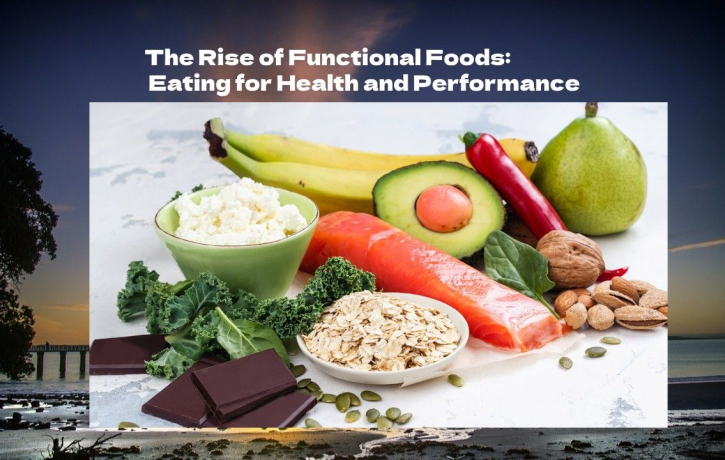
In recent years, there has been a significant change in the approach of people toward food and nutrition. The food is now sought not just to fill the hunger or satisfy the craving but for additional health benefits, improved performance, and overall well-being. These changes in dietary habits have led to the development of functional foods, which are nutrient-rich foods designed or naturally endowed with specific functions and benefits for health.
Functional foods are at the forefront of a growing movement toward preventive health, empowering consumers to take control of their physical and mental performance through smarter food choices.
What Are Functional Foods?
Functional foods are products that provide added health benefits beyond basic nutrition. They may promote increased immunity, enhance energy levels, improve cognitive function, or even help prevent chronic diseases. These foods are either naturally rich in beneficial compounds or they may be fortified with vitamins, minerals, probiotics, or other bioactive agents.
Some examples of functional foods include:
Fortified foods: Orange juice that has calcium added, cereals with vitamins, and plant-based milk with added omega-3s.
Naturally functional foods: blueberries (rich in antioxidants), fatty fish like salmon, which are loaded with omega-3 fatty acids; and turmeric, containing curcumin, known for its anti-inflammatory properties.
The Rise of Functional Foods
It is due to a variety of factors. Increased awareness of the relationship between diet and health has led consumers to look for foods that are more active in supporting their wellness goals. Busy lifestyles and rising healthcare costs have further driven people to take preventive measures and have resorted to functional foods as a convenient and relatively cost-effective solution.
Advances in food science and technology have also enabled the production of innovative products that respond to specific health needs. This ranges from protein bars, designed for athletes, to probiotic-infused gut-friendly drinks, an expanding market for functional foods.
Functional Foods for Performance
These are especially attractive to those looking to improve physical or mental performance. Athletes, for instance, use nutrient-dense foods to fuel workouts, aid in recovery, and optimize performance. Chia seeds, which are rich in energy-sustaining omega-3s and fiber, and beetroot juice, which improves blood flow and endurance, have become staples in sports nutrition.
Another area where functional foods shine is in cognitive function. Foods rich in nootropics, such as walnuts, dark chocolate, and green tea, are believed to improve memory, focus, and mental clarity. With the rise of remote work and demanding schedules, these brain-boosting options have gained popularity among professionals and students alike.
Functional Foods and Disease Prevention
Perhaps one of the important contributions of functional foods is in their capacity to prevent the development of chronic diseases. Oxidative stress is combated by fruits and vegetables that are rich in antioxidants, reducing the onset of disease such as cardiovascular disorders and cancer. Other products high in dietary fiber have been found to provide support toward heart health, since it reduces cholesterol and stabilizes blood sugar levels.
Probiotic-rich products such as yogurt and fermented foods, for example, kimchi and kefir, are also linked to better gut health, more and more acknowledged to play a central role in general health and well-being. Healthy guts are associated with improved digestion, a stronger immune system, and even better moods.
Challenges and Considerations
While the benefits of functional foods are clear, there are some challenges to consider. First, not all functional foods are created equal. Many processed products labeled as “functional” may contain added sugars, preservatives, or artificial ingredients that counteract their health benefits.
Other functional foods can be expensive for the consumer, and organic, fortified, or specialty items often are a premium product that is less accessible to some populations.
Functional foods also need to be taken in the context of an overall balanced diet. No single food will provide all the nutrients your body needs, and overreliance on any one item may create imbalances.
How to Incorporate Functional Foods into Your Diet
Adding functional foods into your daily meals does not have to be a headache. Start by focusing on whole, natural options: fresh fruits, vegetables, nuts, seeds, and lean proteins. For example, exchange sugary snacks for a handful of almonds, or incorporate avocado into your breakfast for a dose of healthy fats.
If you do opt for functional foods, read labels carefully so that you get the actual benefits without extra additives. Find products that have less processing and the nutrient content is clearly written.
Functional foods can also be helpful in meal planning. For example, blending spinach, berries, and flaxseeds into a smoothie or making soup with lentils and turmeric is easy ways to incorporate nutrient-dense ingredients into your routine.
The Future of Functional Foods
As demand for functional foods continues to grow, innovation is expected to continue in this area. Scientists and food manufacturers are finding new ways of enhancing the nutritional value of everyday items, from plant-based proteins to bioengineered ingredients. Personalized nutrition- functional foods tailored to the genetic makeup, lifestyle, or health goals of an individual-is also an emerging trend.
Moreover, there is a growing trend of sustainable functional foods. Snacks made from algae or ingredients derived from upcycled by-products are examples of a new movement toward responsible consumption.
Conclusion
Functional foods mark an important shift in how people perceive nutrition and health. The adoption of nutrient-rich options will enable individuals to make proactive decisions about their health and wellness, enhancing performance, disease prevention, and overall healthier living.
Whether it’s to increase physical stamina, hone mental acuity, or just to have a healthier and longer life, functional foods can be delicious additions and influences to your life.







